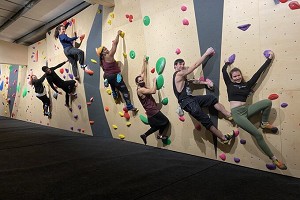
Chris Hamper - a lifelong climber with Parkinson's disease - writes about an initiation into the world of paraclimbing competitions. Amid the uncertainty of a pandemic year and other complications, it turns out that simply getting to the events is half the battle...
When I first received my Parkinson's diagnosis I wondered if I was eligible to compete as a paraclimber — apparently not, pity, I could have won. I don't know what has changed. Maybe I asked the wrong person, but it seems that now I can, the problem is now I have no chance of winning. It's not all about winning of course, the prizes aren't that good anyway. No, it's about the process; all the thinking about it, having something to talk (and write) about and motivation to train.
I applied to enter the Norwegian national championship, even joined a climbing club in Førde. It's called Våtedalen Tindeklub which means wet valley climbing club, strange name. Filip, my latest climbing student, joined too. He was to compete in junior lead and speed. There is no paraspeed climbing and even if there was I wouldn't be in it. Parkinson's slows you down; when I climb I feel like I am going at normal speed but when I watch myself on video I climb like a sloth. People comment that I must be really strong, but only in their frame of reference — in mine I am making wild slaps, almost falling off every move.
I'm in the RP2 category, that's for people with limited range of movement or weakness in the limbs. It's a strange group and could include people with all types of illness: stroke victims, ME, MS, motor neurone disease, although there are probably not so many competitors with motor neurone disease, at least not for long. Actually I'm guessing — I don't really have a clue who it includes except that it seems to include me.
The competition was to take place in Sogndal about three hours from home. I've been there a couple of times, it's where I won the county championship. The competitors' names are displayed online, but for a long time I was the only one. Eventually there was one other. I looked him up on Facebook; he was in a wheelchair. There were photos of him climbing some slabby routes with big holds. This is going to be easy, I thought, but it didn't feel right. I imagined that he had got into climbing as an activity he could do with his disability or whatever you are supposed to say these days, Lack of ability? Didn't look like he was a "climber". No one else applied, maybe this was because of uncertainty due to COVID, or maybe there are only two RP2 paraclimbers in Norway.
The competition was cancelled, but I did get invited to join the national team. I didn't apply because I'm not Norwegian so wouldn't be able to compete. The reason I haven't applied for citizenship is that, even though I can speak Norwegian, I can't write it and you have to do a written test. I am illiterate, a member of the illiterati. I could get exemption by taking a 300 hour course but I'm not doing that. It's a strange rule; if I did the course I would learn how to write but wouldn't need to. A week before the deadline I was asked again; they said I could enter the open events. There was going to be one in Imst. I applied and was accepted.
Being in a national team isn't just about the pride of representing your country, it's about sponsorship. I would not have to pay to go to the comps. I'd also get a national team kit: T shirt, jacket, trainers and climbing shoes. I actually ended up with a choice of two brands. I've only had one pair of the one I chose, they were given to me for the competition in Leeds. I fell off the semifinal when my foot slipped so have never liked the brand, but I like free ones. I never got sponsored when I was a good climber, never needed it as I had a full time job. A bit ironic that now I climb worse than ever, I get a sponsor.
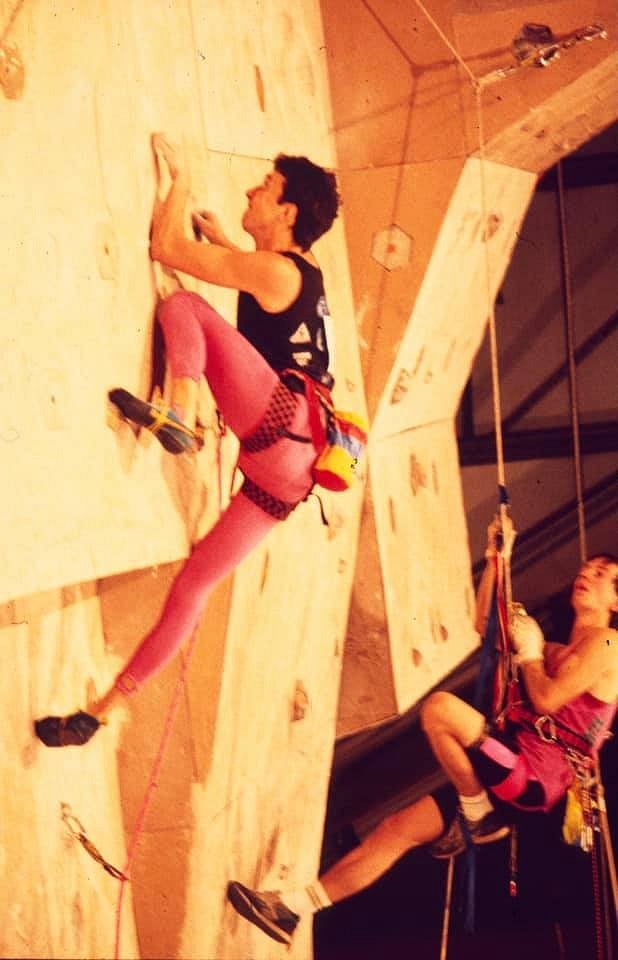
I've probably only climbed about ten lead routes on plastic and one of those was a jamming crack. I'm colour blind, so find all the coloured holds confusing. "Can I use that?" "You're standing on a green." Competitions should be better, only one route up the wall.
Climbing plastic is different to climbing rock, it's pretty impossible to read a rock route from the bottom, you can't see the holds so it's not a skill I have developed. I work out what to do when I get there. In competitions you are given five minutes (I think) to read the route; I would have to pretend, maybe I could attempt to spread some false beta. I can work out the first three moves then I lose interest. At least I won't fall off the start. On rock you often have a choice of holds, so if you don't like one you don't have to use it. There is also a huge selection of footholds so you can pick one to suit. Plastic routes are made to measure. When I brush a boulder I always forget to brush the footholds, I wonder why that is.
Not only do I not climb on plastic, I don't climb with a rope; I only boulder. There is no paraclimbing bouldering on an international level. If you've ever jumped off a boulder in the dark you'll know why blind people don't boulder — you can't see the ground coming. Wouldn't be good for climbers with no legs either, they'd be stumped. One handed climbers would be OK, although might have difficulty matching the top hold — do elbows count?
Due to COVID, our first meetings were online. All team members had to do a course about performance enhancing drugs. I take drugs every day and they certainly enhance my performance. Without them I wouldn't be able to move. Those drugs aren't banned though. I might experiment doubling the dose to see if I climb better. Maybe not. We then had a presentation about food and how it's dangerous to lose weight for a competition. There goes that plan. Someone should tell boxers this. It was a bit like being at school — in fact, most of the others are still at school. The para team then had a webinar with British expert Ian Dunn.
I of course know Ian from old. Everyone used to call him Squawk. I'm not sure why — he doesn't speak in a squawky voice, that was squeaky Dave or John or something. I used to think Squeaky was Squawk. Squawk used to work for Bendcrete climbing walls. Bendcrete walls were made of concrete; they were supposed to look like real rock but they didn't, they looked like concrete. It seems like Squawk made a career out of it; he now manages the Brit Para team. I've seen him with them on a video, they're pretty good. Squawk went through all the details of competitions and some stuff about training. Did you know that if you drink water you get 30% stronger? Forget the training, I'm just going to start drinking water. I asked him about the difficulty of the routes. "You'll have no trouble Chris". He's thinking about how I used to be. I've seen pictures of that wall at Imst, it's massive.
I searched YouTube for some para videos. I found one, Briançon, another massive wall. Ah, they top rope. Makes sense for the one-handed climbers. "So you got to the top of the route then?" "Yeah on a top rope." Doesn't really count does it. I almost never top rope, just can't try hard enough. Climbing hard is about enduring pain, no point if it doesn't count. I shouldn't really lead, it's not fair on my belayer. In my time frame everything is normal but to them it seems to take me ages. I hang staring at the carabiner, my hand poised to clip but for some reason not able to do it. With a sudden movement I shake the hand into action but drop the rope, the belayer takes in quickly only to pay it out again as I go for a second attempt, third time lucky. No wonder my right arm is so strong. Probably best to stick to top roping. Would have made good TV though.
The routes didn't look easy, so I built a Moonboard. Not a brilliant idea; you can't train stamina if you can't hang on. All I got was strained tendons. Resorted to pull ups hanging from loops of tape around my wrists because I couldn't hang on the bar. Watched some videos on finger taping and I was in action again. Posted a video on facebook. "Hey dude, what's up with the fingers?" Not sure if it's the tape or the injuries, but I can't really bend them. I have to three-finger drag everything, crimps, slopers, jugs, you name it I drag it. Three finger drag queen.
To become eligible to compete at international level you need an IFSC license. I thought I would have some tests by a specialist to test my strength etc. I was worried that I might be too strong; I could always fake it but didn't want to cheat. I am pretty weak at everything but climbing. I'm quite weak at that too, but it's relative. I used to be pretty strong but now I can only do a front lever with both hands and one one-arm pull up on a jug. The one arm lever wasn't a regular trick, I did it once and somebody saw me. Probably more than one, I doubt if I would have bothered without a crowd. It's now on the internet, in the UKBouldering forum Legendary Feats of Strength: "Chris Hamper doing a one arm front-lever; well, it turned more into a side-lever but rather beastly nonetheless." Thank you Bubba. An advantage of an unusual name is that when I Google it it's almost all about me.
So I used to be very strong, but Parkinson's has made me weaker. If I climb well it's because I'm a good climber, not because I'm faking the disease. If I didn't have Parkies I'm pretty sure I'd still be climbing 8a like I was 10 years ago.
There is no special test, just a doctor's note. It says: 'Parkinson's disease. He has tremor, rigidity, bradykinesia and reduced muscle force, especially in his left hand. He is not able to use a knife or a fork with his left hand.' Well I've never been able to use a knife with my left hand. It would have done the trick except it got rejected due to the doctor's illegible signature. I thought doctors had to have illegible signatures. I sent a copy with the doctor's name hand-written but haven't heard back, maybe it doesn't matter. Imst was cancelled due to COVID.
My hopes were revived when, even though not an open event, I saw my name on the participants list for Innsbruck; an even bigger wall by the look of it, maybe we would climb round the back. There were even some other competitors on the list. I looked them up on Facebook and asked to be their friends, they all accepted. Blumin 'eck. Beasts. Some of them may have to use a wheel chair or sticks to get to the wall, but their upper bodies made up for it as they swung from hold to hold. Training videos of campus sessions, rippling back shots. Podiums. What on earth am I getting myself into at the age of 64?
I'm not saying that these weren't super athletes, but Facebook gives a selective picture — take a look at mine. 6c boulders climbed in perfect slow motion control, Kilter sessions, Moonboard, shirt off shots showing every muscle. No videos of me on the way to work, legs wobbling out of control, bad days when I can't do a pull up, fat days with my tummy bulging. It doesn't show all the 6As I can't do on the Kilter or that I actually can't get off the ground on the Moonboard. Maybe they are worried.
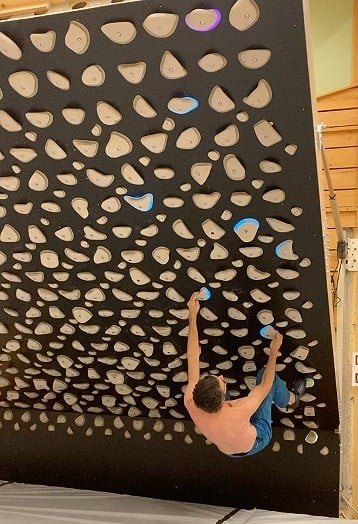
In preparation for the big comp, the team met in Oslo. It was some time since I had travelled so I was quite nervous. I had to wear a face mask on the plane. Funny how everyone else had a blue face mask but mine was white. It was inside out. The father of one of the competitors Iben, had asked me if I could meet his daughter at the airport and take her to the hotel. She is blind. She lost her sight at school when another child shot her with a staple gun. How many times have you been told by a teacher not to do something because it could make someone blind? Well, there you go, it's true. I have climbed with two blind students, both from Poland. Pawel was good, Martha not so good. She was taking ages on a short climb and it was time to go home. She was nowhere near the top, but was determined to get there. One move later I announced that she had reached the top. Luckily she didn't ask to touch the anchor and came happily down. Fortunately no one witnessed my scam and she never knew. Sorry if you're reading this, Martha.
Iben's dad sent a photo so I would recognise her. I couldn't find her, however there was one girl with the peak of her cap pulled over her face. Maybe it's her, I'll get a closer look. I walked past several times trying to look under her cap. There were a couple of policemen watching me. I thought I had better explain myself, so asked them if they'd seen a blind girl I was supposed to meet. Blind date. They hadn't. Maybe I should just ask. But what if it's not her? I went for another viewing; she raised her head, it was her but she wasn't completely blind. I may be able to see but I had no idea where to go. She couldn't see where we went, so had no idea that we circled the airport several times. "Big airport this". I'm not used to big cities with big roads. At one point we walked down the middle of a wide road. There must be some non-visual clues that signify when a road is a road like the sound of cars. Iben was getting worried. I also kept forgetting that I was leading the way and started following Iben. "You really can't see much, can you?"
We met at breakfast, I forgot my mask and was told to go and get it. "How can I eat breakfast with a mask on?" "It's for when you get the food, sir". Oh. There were two one-legged climbers and one one-armer. I hope he can do one arm pull ups, if not he's screwed, I thought. Later that morning a girl in a wheelchair also turned up. Not sure what was wrong with her, I didn't like to ask. She didn't say much, unlike Iben who chatted away all the time. The two one-leggers, Sebastien and Eirik, wore a prosthesis in the form of a metal bar with a foot on the end. Now that's what I call a proper knee bar.
It's difficult to know the protocol when it comes to jokes about disability. Are we all in it together, or is it only people with one leg who can make one-legged jokes? There was once a classic Guardian "type setting error" about South African runner Oscar Pistorius. It described him as a legend, but the word had been split between two lines, Leg-end.
At the wall we did a simulated competition, but we didn't have enough people in each category so competed against each other. Whilst they read the route, I read the label on my new climbing shoes. We got to keep the shoes, but for some reason had to give back the shorts, jacket and vest. I never tried on the jacket but the vest made my arms look big so I would have liked to have kept it. I'm quite conscious of my skinny legs, so never wear shorts. This became apparent later in the day when our manager, Kjersti, asked me if I could put them on the right way round before we had our photo taken.
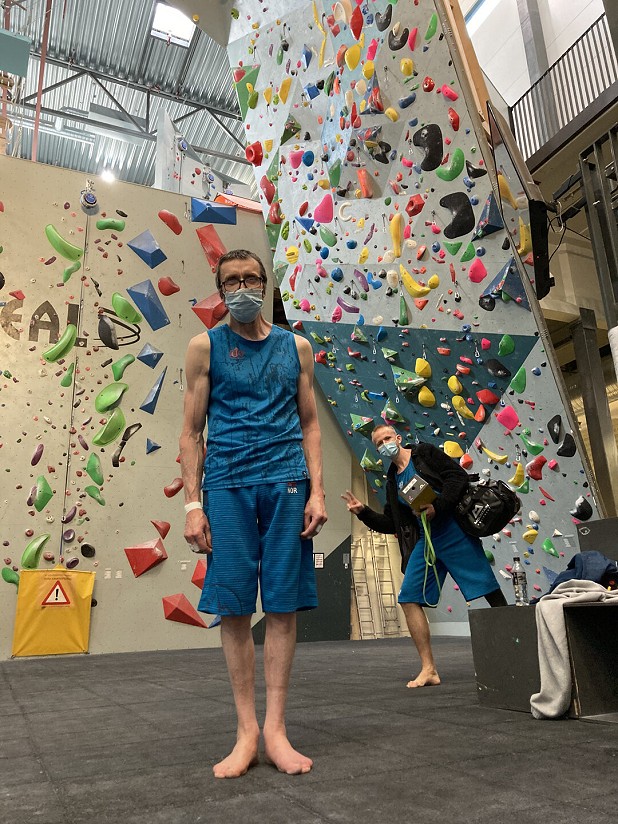
Sebastien and Eirik both wore their prothesis to climb. I think if I had one leg I'd climb without: just think of the weight loss? With my thin ankles, about half a kilo. I once injured a ligament in my right knee doing a drop down move on the first day of a trip to the Gorges du Loup. I continued climbing for the rest of the week with one leg dangling. I did a 7c. Both climbers had a small foot on the end of the kneebar. I don't know why they had chosen a small foot, maybe weight saving or cheaper shoes. I think I would go for a normal size. When climbing they used the foot as support, but it always looked like it would pop off. It seemed to be very stiff, I think I'd have a flexible foot. It's very easy for me to suggest how they should climb, but I of course have no idea — as have the people who designed the knives and forks supposed to help me eat. Like their feet, all the special cutlery looks like it's designed for children. I noticed that Sportiva only supplied a shoe for their real feet. They'll have to hide their Boreal right feet in the photos..
The routes were all set amongst holds of different colours. I quickly played the colour blind card, which seemed a bit pathetic since Iben could hardly see at all. The routes weren't particularly to my liking. I'm used to 40°, these were more like 10°. It's a funny thing, but the easier it is the more difference my disability makes; I just can't decide which hold to use. Being more used to bouldering, I can skip holds with ease, but this is not the most efficient way to climb a long route. The first route was quite easy and I topped out. So did most of the others. I'm not used to doing more than one route a day, so didn't perform so well on the others. I'd skip up the start, but run out of steam half way up. I think I came 3rd.
Isak the one-handed climber came 1st, he was the most impressive to watch. You'd think he wouldn't be able to crimp, but he can; there's a little bit of cartilage in the end of his stump which he can hook over small holds. Using gristle not muscle probably means he can hang off a crimp all day, the problem is he can't always reach them. I didn't ask, but I guess hand jamming might be a problem but who knows, he might have another bit of cartilage tucked away somewhere. He told me that the most annoying thing is when people try to select problems for him to try because they think they would be suited to him. That was just after I had said that the top of the final route had been made with him in mind because the slopers, which he hates, were all so close to each other. Oops, we live and learn.
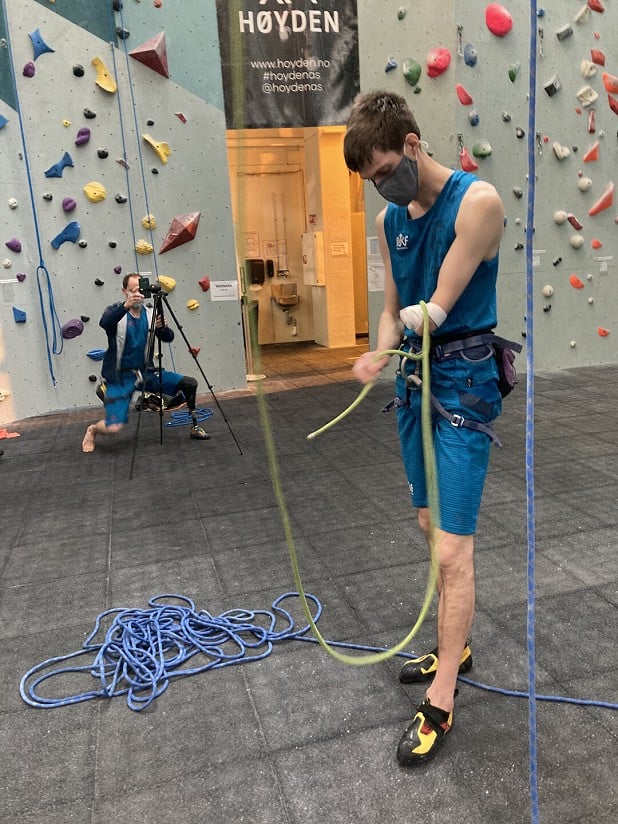
We didn't drink beer that evening — apparently it's not allowed on training weekends. Not sure if we'll meet again. I discovered that I probably can't compete in Innsbruck due to my nationality. It was suggested that I could just go anyway and not tell anyone but the possibility of a humiliating disqualification is too embarrassing to risk. Anyway, what's the point of going to Austria if I can't have a beer?
Postscript: Since writing this the team have been to Innsbruck, Briançon and Moscow. They even got some podium finishes. I could have gone too and pretended to be Norwegian, but I think I might've been found out. Matt Groom did the commentary for the live stream and probably knows who I am and where I am from, that would've been embarrassing. I watched the live stream. Matt interviewed one of the competitors. "We aren't here to win, we are here to take part, meet other competitors and have fun." Or something like that. WHAT! I would be there to win. That's the point isn't it?
The team have a messenger group they use for communicating. Throughout the competition I received their messages. COVID this, COVID that. "Who's cooking dinner?" Where's Iben?" "Which bus do I get?" Just reading stressed me out. I'm too old for this. I don't want to cook dinner in a hotel room or get lost in a city. I'm done with adventures. So it turns out that even though Parkinson's has got me into the team, it prevents me from getting to the competitions. Just can't win.
- ARTICLE: Last Blast 25 May, 2023
- ARTICLE: One Hand Clapping 26 Sep, 2018
- ARTICLE: Rock Bottom 20 Dec, 2017
- ARTICLE: Spotting the Nutter in Fontainebleau 22 Feb, 2017
- ARTICLE: Losing the Thread 15 Nov, 2016
- ARTICLE: Shaking Out: Climbing with Parkinson's 8 Oct, 2015

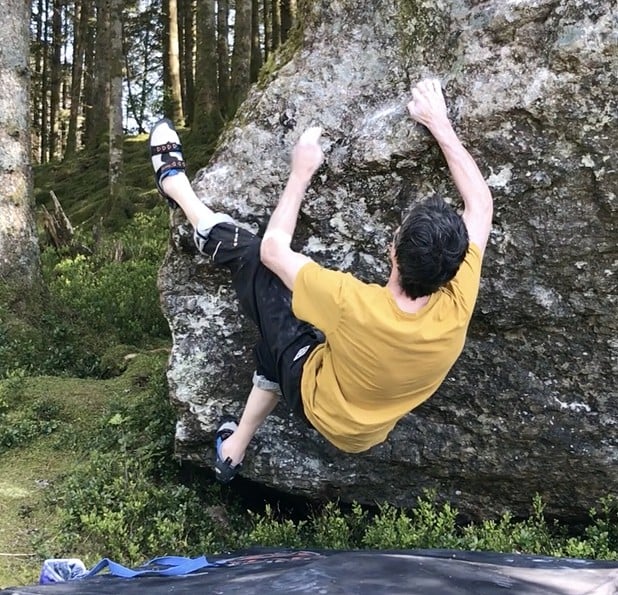
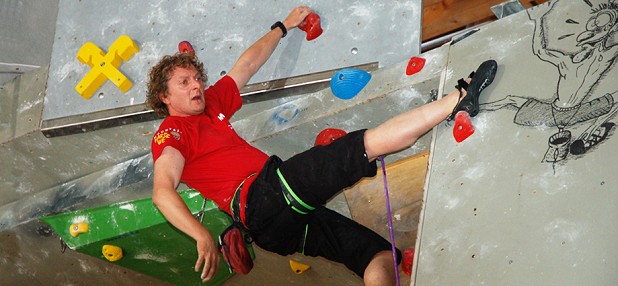
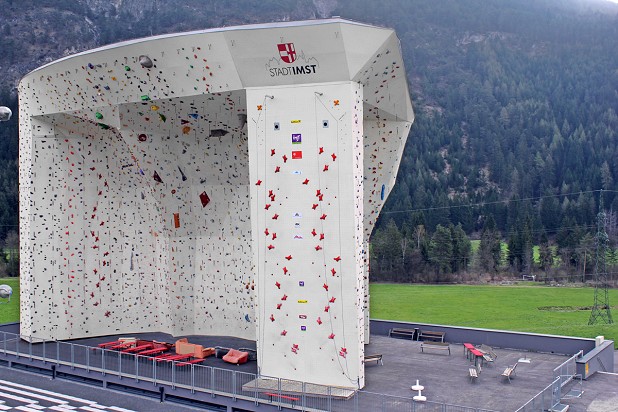
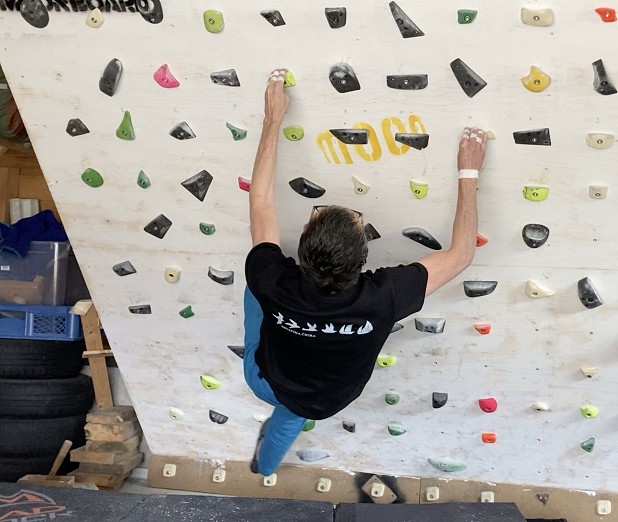
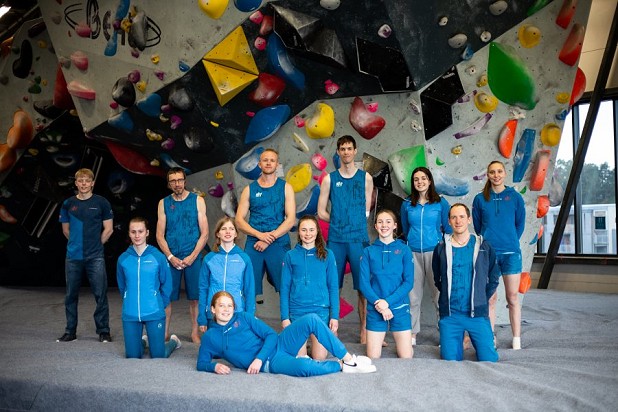
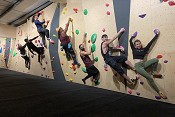
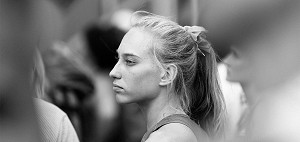

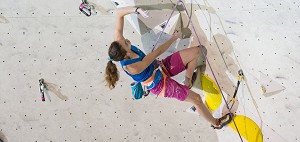









Comments
Really lovely piece. Thanks for sharing it
Steve
I love the way Chris writes. So unassuming. So effortlessly funny.
If you're reading this, Chris, you were a bit of a climbing hero of mine when I was first starting in Leamington in the 70s, hearing tales from Ted Lister about your exploits on rock and on Kenilworth Castle wall. But by the time I'd finally got my arse up some half-decent grades you'd disappeared from the scene seemingly without trace. Apart, that is, from the tales I occasionally heard of you, several stone overweight after 6 months on the couch, ending up at a crag and warming up on an E5. I don't know how true those tales were. I don't care. They were inspirational. You were an inspiration. You still are, both with how you appear to be living with Parkinsons and how well you write - about Parkinsons, about climbing, about life. Please keep the inspiration flowing.
Thanks. Writing it was fun.
A couple of corrections:
Erik and Sebastien knee-bar with their left legs.
I think it was squeaky Mark not John or Dave although still not 100% sure.
They haven't actually been to Moscow yet.
John, I of course remember you arriving at the Warwick wall with Ted in your school uniform. In those days it was the done thing to solo on the climbing wall. Ted used to have a solo circuit that he would cruise around. It's where I was introduced to the art of nonchalant climbing. No power screams, just yawns.
Lovely sense of humour. I enjoyed this read.
Really enjoyed reading that, very well written.